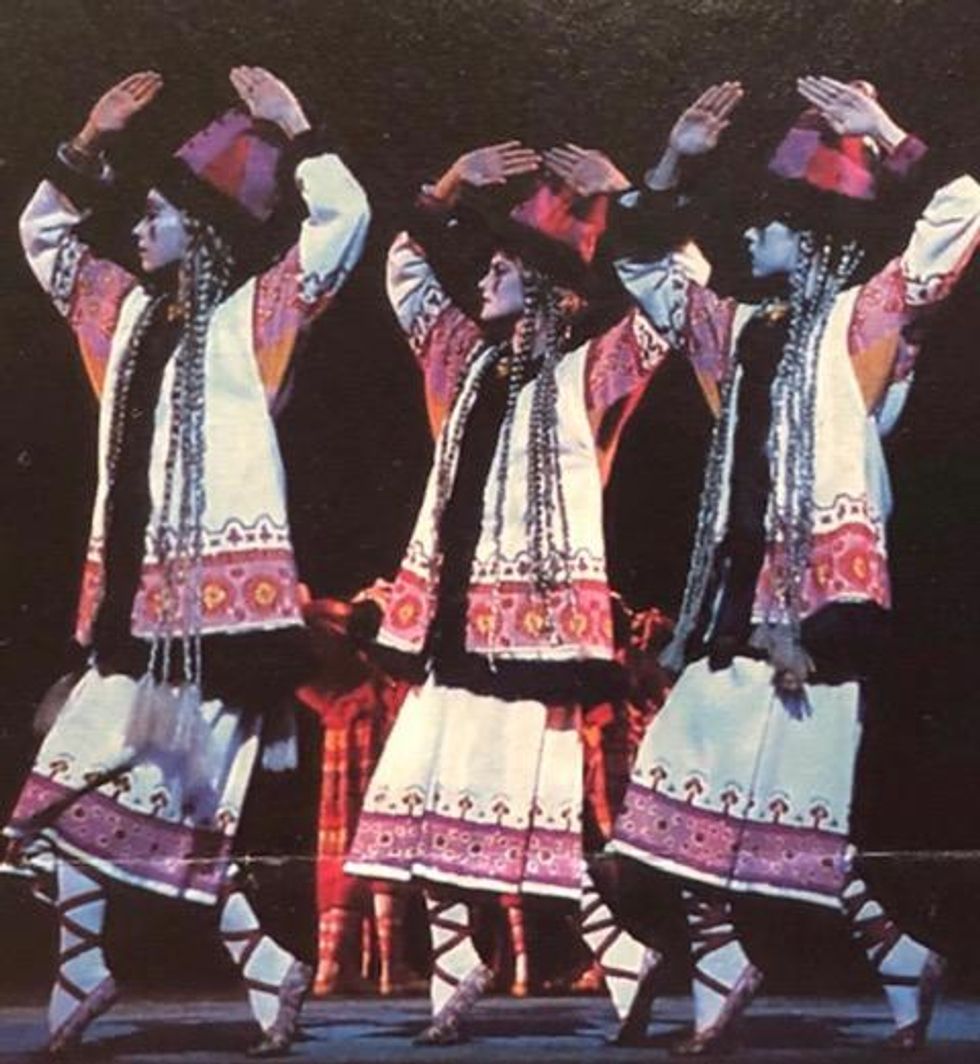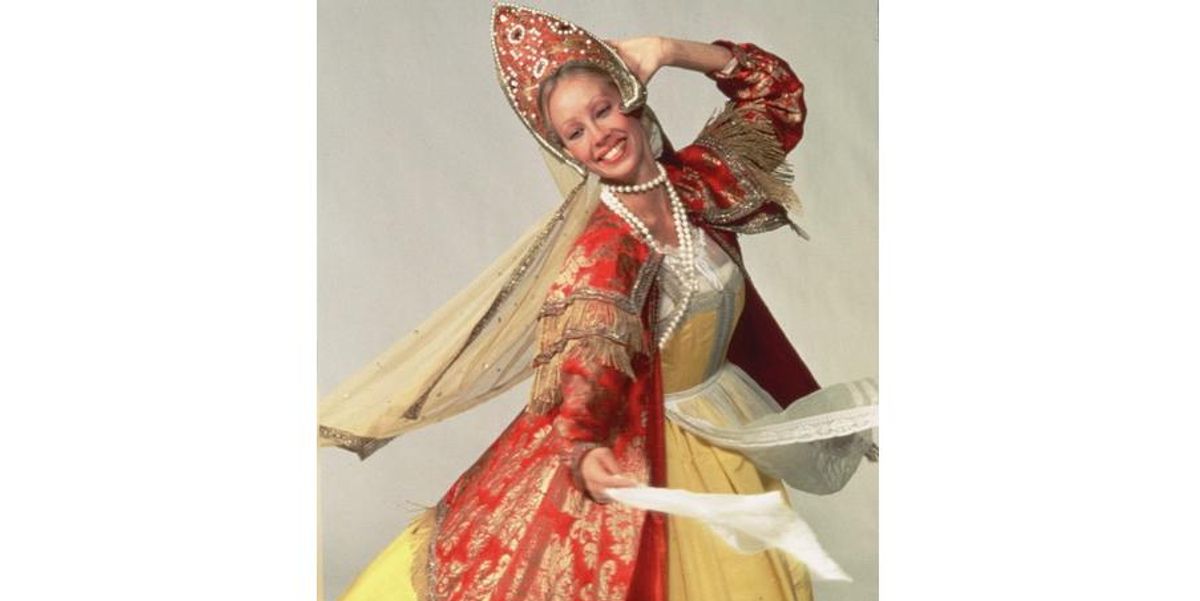In Memoriam: Joffrey Dancer Charlene Gehm MacDougal, 69
Former lead dancer with The Joffrey Ballet, Charlene Gehm MacDougal died of ovarian cancer on January 10 at her home in New York City, age 69.
Gehm illuminated the inner life of each of the varied characters in her extensive repertoire. Whether she was the gracious hostess in George Balanchine’s Cotillon, the riveting Lady Capulet in John Cranko’s Romeo and Juliet, or in the tumult of William Forsythe’s Love Songs, she drew the viewer’s eye and heart to the essence of the role.
As Forsythe puts it: “Charlene was certainly one of the most elegant dancers I have had the privilege to work with. Her striking countenance flowed into her work and, joined with her wicked sense of humor and intelligence, created thoughtful, mesmerizing and memorable art.”
“Char,” as friends called her, had grace and dignity. Her refined, translucent beauty and long limbs led to modeling for Sergio Valente jeans, and in print advertisements for Capezio. She put her physical attributes to the service of her dance artistry in harmony with a remarkable quality of both vulnerability and resilience, always alive to the character she portrayed and to the dance itself.
“We will always see Char in Le Sacre du Printemps, treading on 3/4 pointe, as if she were whispering in each tiny step a vision of pagan Russia she’d seen in a trance,” recalls Millicent Hodson. When Hodson and her husband, Kenneth Archer, were casting their re-creation of Nijinsky’s revolutionary 1913 work for the Joffrey Ballet in 1987, they described to Robert Joffrey “the three tall women in mauve (a sign of refinement in that archaic world of the Slavs),” Hodson says. His immediate response was: “You’ll want Charlene for that.”

Le Sacre du Printemps, with Charlene Gehm MacDuogal on the left
Herbert Migdoll
Joffrey was quite ill when Sacre was being rehearsed for the fall season in New York City (he died in 1988), yet he went to a final run-through at New York City Center. “When he saw the entrance of Char with the other Mauves, he stood up and shouted ‘The storks!,'” says Hodson. “That’s what Marie Rambert had told Robert when he was a young choreographer with her company in London. That’s how she said Diaghilev’s dancers had nicknamed the Mauves’ entrance. He had forgotten it until that moment. Char’s reaction was unforgettable: She’d just witnessed Joffrey recalling Rambert recalling Sacre as it was first created. She did not smile. She truly glowed.”
Denise Charlene Gehm was born in Miami, Florida, in 1951 and lived in a “very tiny house,” as she described it in The New York Times. Her mother was a caterer, her father, a teacher who created a mini dance studio in the carport for her to practice ballet, tap, jazz and acrobatics. She loved the discipline instilled by her parents—homework first, then dance practice, then play. This schedule became essential from the age of 10, when her 18-year-old sister died in a car accident. The burden of familial success seemed to fall entirely on her shoulders, and it was decided that dance held her future.

In The Nutcracker with Daniel Baudendistel
Herbert Migdoll
“It was like, ‘Whew, this thing better work because they don’t have my sister any more.’ It wasn’t some tragic play where it never happened,” she told Debra Weiner in a New York Times interview last year, “I danced on stages in great opera houses around the world. It was big. It was wonderful.”
On a scouting visit to Miami, master teacher David Howard selected 17-year-old Charlene for a scholarship to the Harkness Ballet School in New York City. She danced with the Harkness Youth Dancers from 1970 to 1971; as a soloist with National Ballet of Washington from 1971 to 1973; a principal with the Chicago Ballet in 1974; and principal with Ballet de Caracas of Venezuela in 1975.
Then, in 1976, she joined the Joffrey Ballet and found her creative home, remaining there until 1991. Early in her career with the company, Robert Joffrey is quoted as saying “people want to know who that girl is!” Selected in 1979 by Rudolf Nureyev to dance in Nijinsky’s L’Après-Midi d’un Faune, she toured extensively with him, also dancing in the televised version of the ballet for Dance in America on PBS.
My tenure as ballet mistress for the Joffrey Ballet overlapped with Charlene’s dancing from 1989 to 1991, and I remember her generosity and integrity, how she listened to input while also trusting herself. Her dancing was both utterly human and inherently spiritual. Of her performance in Frederick Ashton’s Illuminations in 1989, Donna Perlmutter wrote in the Los Angeles Times: “Charlene Gehm (back with the company after an outing with Phantom of the Opera) personified Sacred Love as a glowing white emblem held on high.”
On Broadway, Charlene performed not only in Phantom of the Opera, where the régisseur believed “her presence on our stage certainly lifted the beauty of the art,” but also in West Side Story, where, as Clarice in the Jets, she worked with Leonard Bernstein and Jerome Robbins. Her versatility in bringing a character to life through movement made her a natural for musical theater. Yet her talents were also evident in every ballet she danced. A succinct tribute to these gifts came from Tobi Tobias when she wrote in New York Magazine: “Charlene Gehm’s Lady Capulet is a marvel of nuance, combining public hauteur, private tenderness, and unbridled grief.”
Gehm’s well-known sense of humor made her “one of the few dancers who can make you laugh,” according to New York Times critic Jennifer Dunning. She did so with “subtlety, grace and a touch of the bittersweet,” as the tipsy Josephine in Ashton’s A Wedding Bouquet, with scenario by Gertrude Stein. In Agnes de Mille’s Rodeo, “Charlene Gehm was typically witty in the role of the ranch owner’s pretty daughter, who is out to snare the wrangler,” observed Dunning again. “Rarely has a hand beckoned with such coy peremptoriness.”
Similarly, Gehm delighted friends with her uncanny perception of the essence of someone, imitating them for full dramatic or comedic effect. Former fellow Joffrey Ballet members remember her with deep affection, often using the word “classy” to describe her. In Hodson and Archer’s meticulous 1988 reconstruction of Balanchine’s 1932 ballet Cotillon, Gehm brought the ballet to life as the ever-present, congenial hostess, with dancing described by colleague Carole Valleskey as “elegant, light, fast, able to handle technical challenges with ease. First and foremost, she danced. You weren’t aware of the steps.”
Following her performing career, and after marrying business executive Gary MacDougal in 1992, Charlene Gehm MacDougal still took daily ballet class with David Howard at Steps on Broadway. She had lived frugally as a dancer, saving her pennies for the college education she could now pursue Choosing the BA program in arts administration at New York University’s Gallatin School for its rigorous focus on writing and reading “great books,” she graduated with honors in 1994 and delivered the keynote address at the NYU Gallatin commencement.
Although she took a management internship as assistant to American Ballet Theatre’s artistic director, Kevin McKenzie (a former Joffrey Ballet partner), she ultimately decided against a full-time job and pursued graduate studies. Her master’s thesis in medieval studies from Columbia University, in 1998, was on the history of stained glass at Canterbury Cathedral, the center of the Anglican/Episcopal church where she had long been a member.
Gehm was a trustee of the Lincoln Center Institute, focused on taking art into the New York City schools. As president of the MacDougal Family Foundation, supporting arts organizations, she oversaw grants for economically disadvantaged students, offering college scholarships at UCLA and helping high school seniors in Chicago. She and her husband traveled extensively, combining biannual trips to Bulgaria, for the America for Bulgaria Foundation, with visits to countries including Tibet, Bangladesh, Uzbekistan, Laos, Indonesia, Armenia and Kosovo.
Gehm is survived by her husband, her two stepsons and their wives, as well as four granddaughters.
During her illness, her husband constantly at her side, friends marveled that even then, as fellow Joffrey dancer Kim Sagami put it: “She was so kind…so brave, stoic and still always caring for others.” Gehm was a person of rare sensibility and courage, and her memory will be carried forward in the hearts of all who knew her. Announcing her passing to the Joffrey Ballet community, former Joffrey principal Denise Jackson Sutherland wrote:
“I will remember Char with her bright, beautiful smile, her quirky sense of humor, her infectious laugh, and her beautiful tresses of gorgeous blond hair. She will be missed.”




